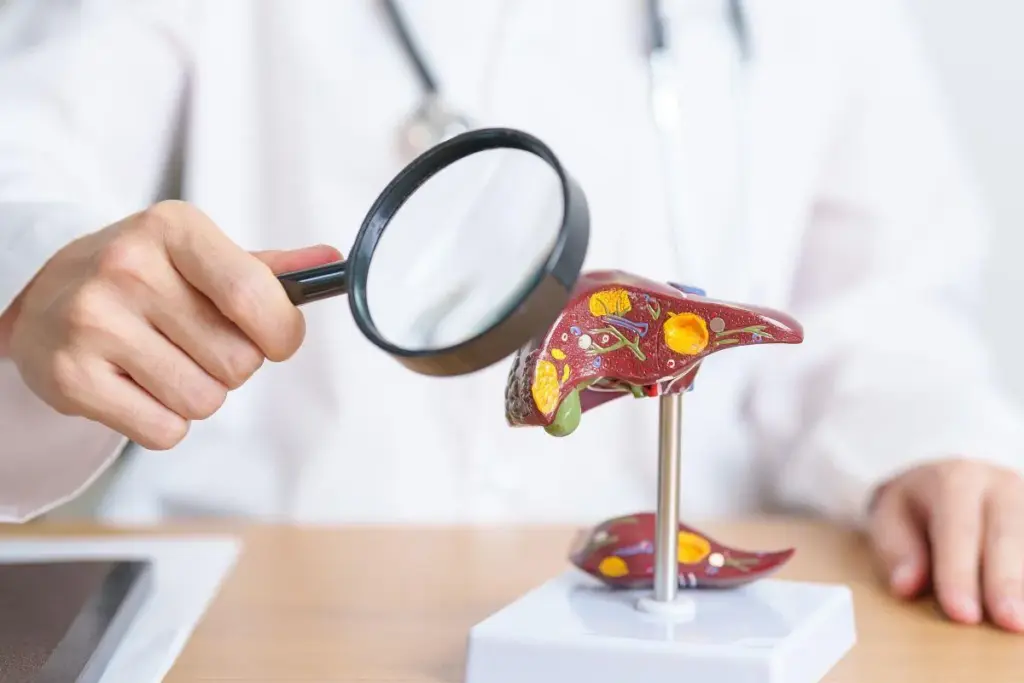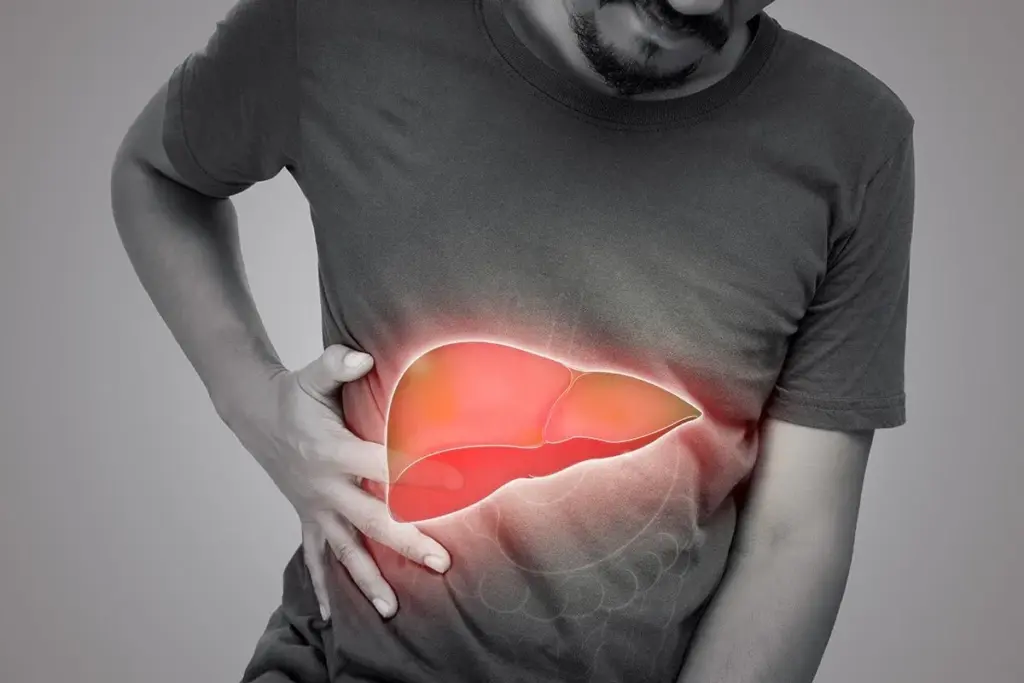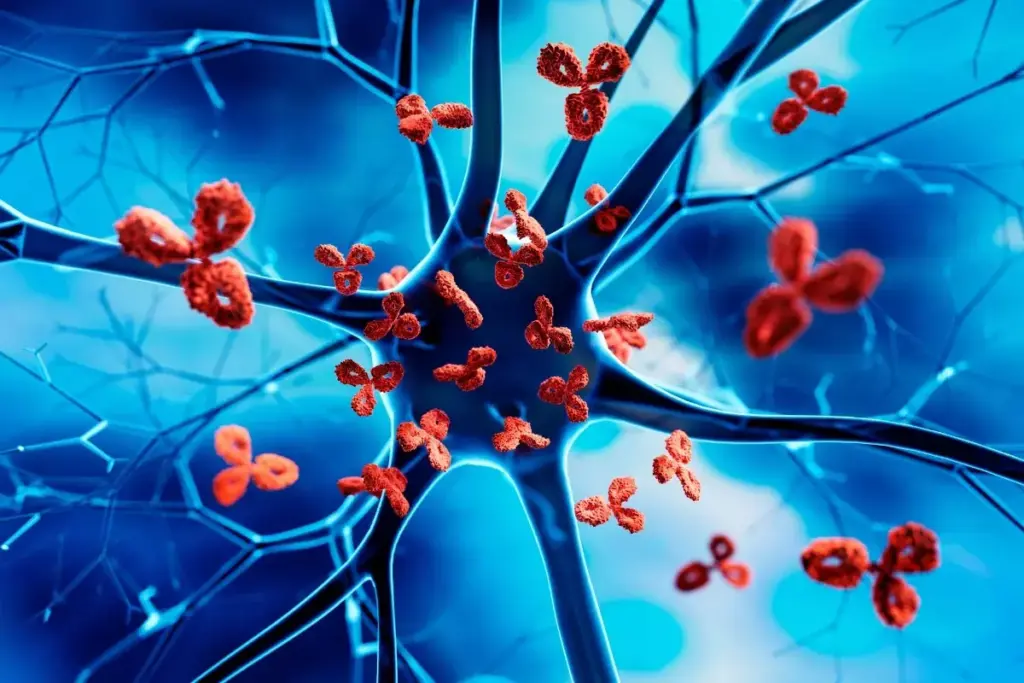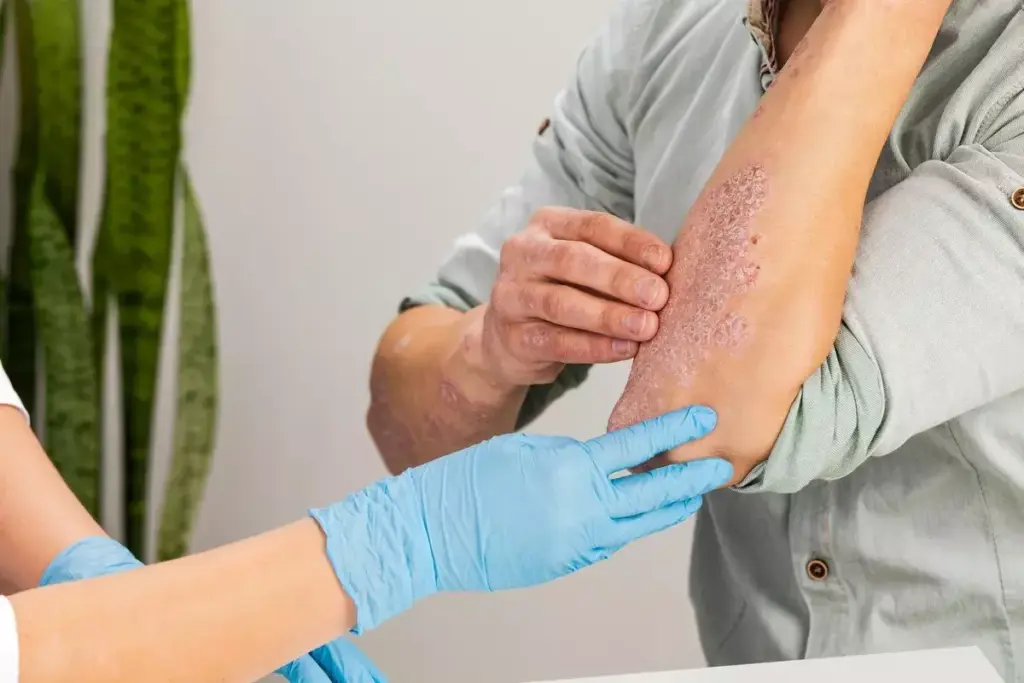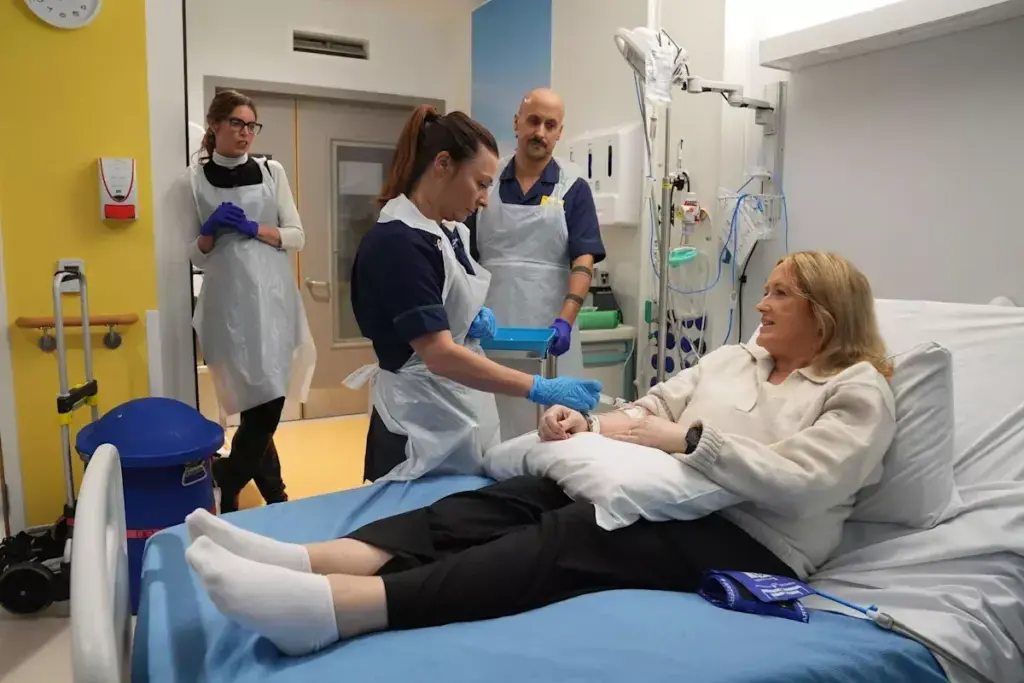Oncologists use CBC blood tests to check on cancer patients’ health. Many cancer patients have blood tests often to see how they’re doing. Patients often ask, “What blood tests do oncologists do? since these tests are a key part of monitoring cancer and overall health.
A CBC blood test gives doctors important info about a patient’s health. It helps them find and treat cancer early. Doctors can spot problems quickly with these tests.
Key Takeaways
- Oncologists use CBC blood tests to monitor cancer patients’ health.
- Blood tests for cancer diagnosis are key for managing patients well.
- CBC blood tests give doctors vital info for diagnosing and treating cancer.
- Regular blood tests help track how cancer is progressing.
- It’s important for cancer patients to understand their CBC blood test results.
The Role of Blood Tests in Cancer Care
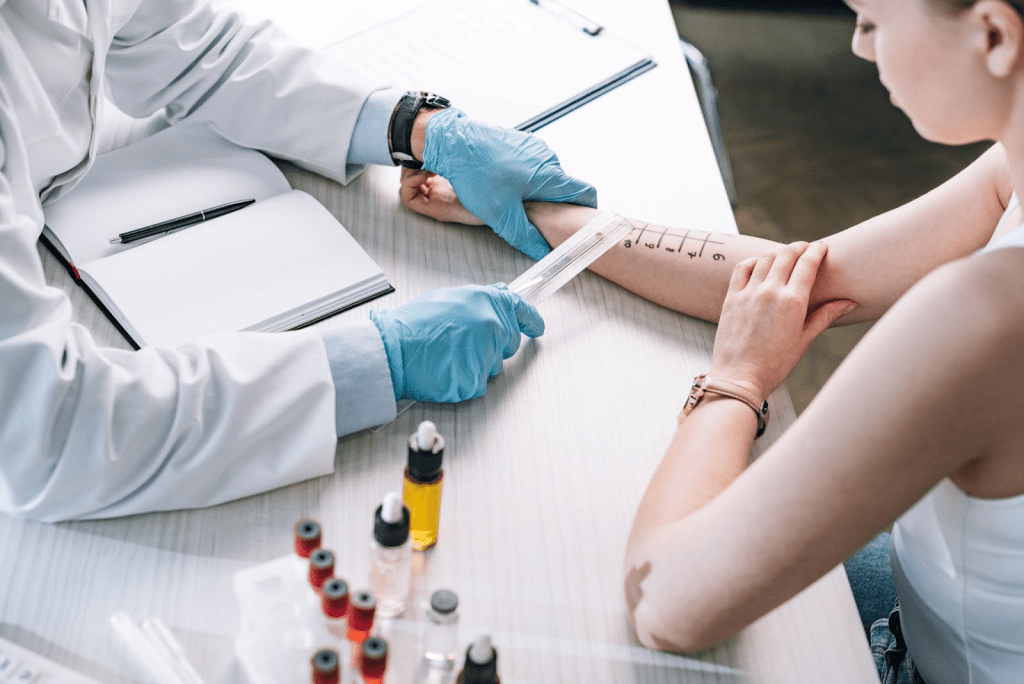
Cancer care involves many steps, and blood tests play a key role. They help doctors diagnose and track cancer. Blood tests give oncologists important info about the disease and the patient’s health.
Why Oncologists Rely on Blood Testing
Oncologists use blood tests because they are a non-invasive way to get vital info. Blood tests can find signs of cancer, like unusual white blood cells or tumor markers. A study in a medical journal says blood tests are key for doctors, helping them make treatment plans.
They also check how well treatments are working. If tumor markers go down, it means the treatment is working.
Blood Tests as Diagnostic and Monitoring Tools
Blood tests are used to find and track cancer. They spot cancer signs, like high protein levels. They also watch how the patient’s condition changes over time.
Blood tests are very important in fighting cancer. They help doctors understand the disease better and plan better treatments.
“Blood tests have changed how we fight cancer,” says a top oncologist. “They help us find and treat cancer better, improving care for patients.”
CBC Blood Test: The Cornerstone of Cancer Evaluation
The CBC blood test is key in cancer diagnosis. It gives a detailed look at a patient’s health. It checks the levels of red, white blood cells, and platelets.
A CBC blood test with auto differential is vital for cancer detection. It spots issues that might show cancer or other diseases.
Components of a CBC with Auto Differential
A CBC with auto differential has several important parts:
- White Blood Cell (WBC) Count: Shows how many white blood cells are fighting infections.
- Red Blood Cell (RBC) Count: Counts the red blood cells that carry oxygen.
- Platelet Count: Checks the platelets, which help blood clot.
- Auto Differential: Gives a detailed count of white blood cells like neutrophils and lymphocytes.
What CBC Abnormalities May Indicate in Cancer
Abnormal CBC results can point to health problems, including cancer. For example:
- Anemia: Low red blood cell count or hemoglobin can mean anemia, common in cancer patients.
- Leukocytosis or Leukopenia: Unusual white blood cell counts might show infection, inflammation, or cancer.
- Thrombocytopenia or Thrombocytosis: Odd platelet counts can hint at various health issues, including cancer.
Oncologists look closely at CBC results. They search for signs of cancer or other diseases. This helps guide further tests and treatment plans.
Comprehensive Metabolic Panel (CMP) in Cancer Diagnosis
The CMP is a key blood test in cancer care. It gives a wide range of info on a patient’s metabolic health. This is vital for doctors to diagnose and manage cancer well.
Key Components of a CMP
A CMP includes several important tests. These tests give insights into different health aspects. They usually cover:
- Glucose levels
- Electrolytes like sodium, potassium, and chloride
- Liver function tests, including albumin, total protein, and bilirubin
- Kidney function tests, including blood urea nitrogen (BUN) and creatinine
- Calcium levels
Each part of the CMP gives important info. It helps doctors understand a patient’s health and how their body works.
How CMP Results Help Oncologists
CMP results are very helpful for oncologists. They first help check a patient’s health before starting treatment. For example, if there are issues with the liver or kidneys, the treatment might need to change.
Secondly, CMP results help track treatment side effects. Some treatments can harm the liver or kidneys. Regular CMP tests catch these problems early.
Lastly, CMP results show how well a patient is eating and their metabolic health. This is key for recovery and managing treatment side effects.
Tumor Marker Blood Tests: Specific Indicators of Cancer
Tumor marker blood tests are key in finding and tracking cancer. They look for special substances in the blood linked to different cancers. Tumor markers are made by the tumor or by the body’s reaction to cancer.
Some well-known markers include Prostate-Specific Antigen (PSA) for prostate cancer, CA-125 for ovarian cancer, and CEA (Carcinoembryonic antigen) for colorectal cancer. These markers help doctors see if treatment is working and if cancer might come back.
Common Tumor Markers and Their Significance
Tumor markers are substances found in higher amounts in some cancer patients’ blood. For example, high Alpha-fetoprotein (AFP) levels might mean liver cancer or certain germ cell tumors.An oncologist, says, “Tumor marker tests are important, but we must look at them with other signs and symptoms.”
“Tumor markers can provide critical information about the presence and progression of cancer, guiding treatment decisions and monitoring for recurrence.”
Here’s a list of common tumor markers and the cancers they’re linked to:
- PSA – Prostate cancer
- CA-125 – Ovarian cancer
- CEA – Colorectal cancer
- AFP – Liver cancer, germ cell tumors
- CA 19-9 – Pancreatic cancer
Limitations of Tumor Marker Testing
Even though tumor marker tests are helpful, they have their limits. Not all cancers have markers, and some non-cancer conditions can raise marker levels. For instance, some benign diseases can increase CA-125, making it less reliable for ovarian cancer.
Doctors must keep these limits in mind when looking at test results. The American Cancer Society points out, “Tumor marker tests are not used alone to diagnose cancer or guide treatment decisions.” They are used with other tests and evaluations to understand a patient’s situation fully.
Blood Chemistry Tests for Cancer Patients
Blood chemistry tests are key for checking cancer patients’ health. They show how well organs and systems work. This info is vital for good cancer care.
Liver Function Tests
Liver function tests check the liver’s health. For cancer patients, these tests are very important. They show if the liver is affected by cancer or if it’s handling medicines right.
Key components of liver function tests include:
- Alanine transaminase (ALT)
- Aspartate transaminase (AST)
- Alkaline phosphatase (ALP)
- Bilirubin levels
If these tests show problems, it might mean the liver is damaged. This could mean changing the treatment plan.
Kidney Function Tests
Kidney function tests check the kidneys’ health. This is very important for cancer patients, as treatments can harm the kidneys.
Key kidney function tests include:
- Serum creatinine
- Blood urea nitrogen (BUN)
- Estimated glomerular filtration rate (eGFR)
These tests help doctors keep an eye on the kidneys. They can adjust treatments to avoid kidney damage.
Electrolyte Panels
Electrolyte panels check the levels of important minerals like sodium, potassium, and chloride. For cancer patients, keeping these minerals balanced is very important. The wrong balance can cause serious problems.
Electrolyte imbalances can result from various factors, including:
- Chemotherapy
- Tumor lysis syndrome
- Dehydration
By watching electrolyte levels, doctors can quickly fix any problems. This keeps patients safe and comfortable during treatment.
Specialized Blood Tests for Specific Cancer Types
Cancer diagnosis has become more precise with the advent of specialized blood tests. These tests are tailored for different types of cancer. They are key in managing patient care effectively.
Oncologists use various blood tests to diagnose and monitor cancer. Each test is designed to detect specific markers or abnormalities. This has improved diagnostic accuracy and helped tailor treatment plans.
Blood Tests for Leukemia and Lymphoma
Leukemia and lymphoma are blood cancers diagnosed and monitored with specific tests. A Complete Blood Count (CBC) with differential is often the first step. It can reveal abnormal white blood cell counts.
For leukemia, flow cytometry helps identify specific cell surface markers. In lymphoma, tests like the erythrocyte sedimentation rate (ESR) may be elevated. This indicates inflammation or disease activity.
| Cancer Type | Blood Test | Purpose |
| Leukemia | CBC with differential, Flow cytometry | Diagnose and subtype leukemia |
| Lymphoma | ESR, LDH levels | Assess disease activity and monitor response to treatment |
Blood Tests for Solid Tumors
Solid tumors, including cancers of the breast, lung, colon, and prostate, are diagnosed and monitored with specialized blood tests. Tumor marker tests are a key part of this diagnostic arsenal.
Prostate-Specific Antigen (PSA) is used for prostate cancer screening. Carcinoembryonic Antigen (CEA) levels can be elevated in colorectal cancer. These tests help in early detection and monitoring of disease recurrence.
“The use of tumor markers in the management of cancer is a rapidly evolving field, opening new avenues for diagnosis, prognosis, and treatment monitoring.”
Understanding the specific blood tests for different cancer types helps healthcare providers make informed decisions. This is from initial diagnosis through treatment and follow-up.
Genetic and Molecular Blood Tests in Oncology
Genetic and molecular testing have changed how we diagnose and treat cancer. These new technologies help doctors understand tumors better. This leads to more personalized and effective treatments.
Circulating Tumor DNA (ctDNA) Testing
Circulating tumor DNA (ctDNA) testing is a blood test that finds DNA from tumors. It’s non-invasive and helps track cancer and how well treatments work.
The benefits of ctDNA testing include:
- Early detection of cancer recurrence
- Monitoring of treatment efficacy
- Identification of genetic mutations
Genetic Mutation Testing
Genetic mutation testing looks at cancer cells’ genetic material. It finds specific mutations that cause tumors to grow. This helps doctors tailor treatments to each patient.
Some common genetic mutations tested in oncology include:
- BRCA1 and BRCA2 mutations, associated with breast and ovarian cancer
- EGFR mutations, commonly found in non-small cell lung cancer
- KRAS mutations, often present in colorectal cancer
Understanding tumors’ genetic and molecular traits helps oncologists create targeted therapies. This improves patient outcomes.
Can Cancer Be Detected Through Routine Blood Work?
Standard blood tests are not made for finding cancer. But, they can sometimes show signs that might mean cancer is present. “The role of routine blood work in cancer detection is often indirect, yet it can be a key first step in diagnosis,” says a top oncologist.
Signs of Cancer in Standard Blood Tests
Certain signs in routine blood tests can hint at cancer. For example, a Complete Blood Count (CBC) might show odd levels of blood cells. This could mean leukemia or lymphoma. Also, odd liver function or electrolyte levels might point to cancer.
Some specific signs in standard blood tests include:
- Anemia or low red blood cell count, which could be a sign of various cancers.
- Abnormal white blood cell counts, which might suggest leukemia.
- Elevated liver enzymes, which could mean cancer has spread to the liver.
When Further Testing Is Recommended
If blood tests show signs that could mean cancer, more tests are usually needed. This might include imaging tests like CT scans or MRIs, biopsies to check tissue samples, or specific blood tests like tumor marker tests.
It’s key to know that while blood work can give clues, it’s not enough to say for sure if you have cancer. As cancer experts say, “A detailed diagnostic plan is needed to confirm cancer and figure out its type and stage.”
More testing is usually needed when:
- Routine blood tests show odd or big changes.
- There are symptoms or risk factors that suggest cancer.
- Initial findings suggest the need for more precise tests.
Blood Tests for Cancer Screening vs. Diagnosis
Blood tests are key in both finding and confirming cancer. But they are used in different ways. Screening tests look for cancer in people who don’t show symptoms. Diagnostic tests, on the other hand, check if cancer is present in those with symptoms or abnormal screening results.
Limitations of Blood Tests as Screening Tools
Blood tests have some big drawbacks when used for screening. These include:
- Lack of specificity: Many blood tests can give false positives, causing worry and more tests.
- Limited sensitivity: Some cancers may not show up in blood tests, even in early stages.
- Variability in results: Things like lab methods and patient health can change test results.
Despite these issues, scientists are working hard to make blood tests better for screening.
Diagnostic Accuracy of Blood Tests
Blood tests can be very helpful in diagnosing cancer. Tumor marker tests, for example, can spot certain cancers. But how accurate blood tests are depends on a few things, like:
- The type of cancer being tested
- The stage of cancer
- The presence of other health issues
Using blood tests with other tools, like imaging and biopsies, makes diagnosis more accurate. This way, doctors can make better choices for patient care.
How Oncologists Interpret Blood Test Results
Blood tests are key in cancer care. Oncologists look at these results with the patient’s overall health in mind. This helps doctors make the best decisions for treatment and care.
Normal vs. Abnormal Values
Oncologists check if blood test values are normal or not. Normal values are based on healthy people. But, each person can be different.
- White Blood Cell Count (WBC): Too high or too low can mean infection, inflammation, or bone marrow issues.
- Red Blood Cell Count (RBC): If RBC counts are off, it could be anemia or problems with making red blood cells.
- Platelet Count: Low or high platelet counts can mean different things for cancer patients.
Considering the Complete Clinical Picture
Looking at blood test results is more than just numbers. It’s about understanding the patient’s health and history. Oncologists look at:
- Medical History: Past health issues, treatments, and allergies.
- Current Symptoms: What the patient feels and what doctors see.
- Imaging and Other Diagnostic Tests: Results from scans, biopsies, and more.
By combining blood test results with the patient’s full health picture, oncologists can make better diagnoses and treatment plans. This whole-person approach is key to improving cancer treatment results.
Blood Tests for Monitoring Cancer Treatment
Regular blood tests are key for doctors to check if cancer treatment is working. They also look for any bad side effects. These tests give important info that helps decide on treatment.
Tracking Treatment Effectiveness
Blood tests are essential to see if cancer treatment is effective. They watch for changes in blood cell counts and tumor markers. This helps doctors know if the treatment is doing its job.
Tumor marker tests check for substances made by cancer cells. These markers show how the disease is progressing and if treatment is working. For example, CA-125 is used for ovarian cancer, and PSA for prostate cancer.
Detecting Treatment Side Effects
Cancer treatments can cause serious side effects that affect blood cells and health. Blood tests find these side effects early. This means doctors can act fast to help.
By watching blood test results closely, doctors can make sure treatment works well. They also manage side effects to improve patient care and life quality.
Blood Tests for Cancer Recurrence Monitoring
Monitoring for cancer recurrence is key in cancer care. It relies on regular blood tests. These tests help find any signs of cancer coming back, so we can act fast.
After treatment, patients need to get tested often to watch for cancer coming back. They might have imaging tests, physical checks, and blood tests. How often depends on the cancer type, its stage, and the treatment.
Follow-up Testing Protocols
Testing plans change based on the cancer type. For example, those with colorectal cancer might get CEA (Carcinoembryonic antigen) tests often. Breast cancer patients might have CA 15-3 or CA 27.29 tests. These tests look for early signs of cancer coming back.
First, tests are done more often. But if no cancer is found, they might not be needed as much. Sticking to the test schedule is key for catching cancer early.
Early Detection of Recurrence
Finding cancer early makes treatment work better. Blood tests are important in this. They spot changes in tumor markers or other signs that might mean cancer is back.
For instance, a rise in a tumor marker might mean more tests, like imaging, to see if cancer has returned. Below is a table showing some common tumor markers and the cancers they are linked to.
| Tumor Marker | Associated Cancer Type |
| CEA (Carcinoembryonic antigen) | Colorectal, Breast, Lung |
| CA 15-3 or CA 27.29 | Breast |
| PSA (Prostate-Specific Antigen) | Prostate |
| CA-125 | Ovarian |
Regular blood tests are vital for watching for cancer coming back. Knowing how important these tests are and following the recommended testing schedule can help patients catch cancer early. This makes treatment more effective if cancer does come back.
Emerging Blood-Based Cancer Detection Technologies
New blood-based cancer detection technologies are changing how we fight cancer. These new methods could lead to catching cancer early. This could help patients get better faster.
Liquid Biopsies
Liquid biopsies are a big step forward in finding cancer. They look at DNA in the blood, not like old-fashioned tissue biopsies. This way is better because it’s easy and doesn’t hurt.
- Early detection of cancer
- Monitoring of treatment response
- Identification of genetic mutations
- Potential for serial monitoring
Multi-Cancer Early Detection Tests
Tests for finding many cancers at once are also on the rise. They can spot different cancers from just one blood test. This could lead to checking for cancer in more people.
- High sensitivity and specificity
- Ability to detect cancers at early stages
- Potential for reducing cancer mortality
These new tools are set to change cancer care. They offer new ways to find and treat cancer early.
Preparing for Oncology Blood Tests
Before getting blood tests for cancer, it’s important to know how to prepare. The right preparation helps make sure the test results are correct. This is key for figuring out the diagnosis and treatment plan.
Fasting Requirements
Fasting is a big part of getting ready for blood tests. Some tests need you to fast for a few hours before. Fasting means not eating or drinking for a set time, usually 8 to 12 hours.
“Fasting is key for some blood tests,” says Dr. Jane Smith, an oncologist. “It makes sure the test results aren’t changed by what you’ve eaten recently.” She adds, “It’s vital for patients to follow their healthcare provider’s fasting instructions to get accurate results.”
Medication Considerations
What medications you take is also important. Some meds can change blood test results. So, telling your healthcare provider about all your meds is a must.
- Patients should give their healthcare provider a list of their medications.
- Some meds might need to be stopped or changed before the test.
- Healthcare providers will tell you how to handle your meds before the test.
By knowing and following these steps, patients can make sure their blood tests are done right. This leads to better diagnoses and treatment plans.
Understanding the Limitations of Cancer Blood Tests
It’s key to know the limits of cancer blood tests for accurate diagnosis and treatment plans. These tests give important info but have their own limits.
False Positives and False Negatives
Two big issues with cancer blood tests are false positives and false negatives. A false positive means a test says there’s cancer when there isn’t. This can cause worry, more tests, and treatments that aren’t needed.
A false negative is when a test misses cancer that’s there. This can delay getting the right treatment, which might hurt patient outcomes.
Many things can cause false positives and negatives. These include how good the test is, other health issues, and lab mistakes. For example, some conditions can make tumor markers go up, leading to false positives.
When Additional Testing Is Necessary
Because of these limits, more tests are often needed to be sure of a diagnosis or to check how treatment is going. This might include CT scans, MRI, biopsies, or other tests. More testing gives a better view of the patient’s health, helping doctors make better choices.
Doctors might ask for another blood test to check results or see how things change. This helps deal with false positives or negatives and gives a clearer picture of the patient’s health.
Conclusion: The Future of Blood Testing in Cancer Care
Advances in blood testing are changing cancer care. They help find cancer early, diagnose it more accurately, and track treatment. With ongoing research, the future of blood testing in cancer care looks bright.
Liquid biopsies and tests for early cancer detection are changing how we diagnose cancer. These tests are non-invasive and give a full picture of a patient’s health. They are expected to make cancer treatment better and improve patients’ lives.
Oncologists will use blood tests more and more to make treatment plans. They will also watch how the disease progresses and catch it early if it comes back. The future of blood testing in cancer care is full of hope, thanks to new research and technology.
FAQ
What blood tests are commonly used in cancer care?
Doctors use many blood tests in cancer care. These include the Complete Blood Count (CBC) with auto differential, tumor marker tests, and genetic tests. They help diagnose, monitor, and manage cancer.
What does a CBC blood test indicate in cancer patients?
A CBC blood test can show signs of cancer like anemia, infection, or leukemia. The auto differential count gives more details about white blood cells.
Can cancer be detected through routine blood work?
Routine blood work can’t confirm cancer. But, it can show signs that need more tests. This includes unusual white blood cell counts or liver function issues.
What is the role of tumor marker blood tests in cancer diagnosis?
Tumor marker tests check for proteins or substances linked to cancer. They help in diagnosis, tracking treatment, and finding cancer again.
How do oncologists interpret blood test results?
Oncologists look at the whole picture. This includes medical history, physical exams, imaging, and blood tests. They use this to understand the results and decide on care.
What are the limitations of cancer blood tests?
Blood tests for cancer have limits. They can give false positives or negatives. More tests are often needed to confirm or rule out cancer.
Can blood tests detect cancer recurrence?
Yes, blood tests, like tumor marker tests, can spot cancer coming back. Regular tests help find recurrence early, when it’s easier to treat.
What is the significance of genetic and molecular blood tests in oncology?
Genetic and molecular tests, like ctDNA testing and genetic mutation tests, are key. They show the cancer’s genetic makeup. This guides treatment plans.
How should I prepare for oncology blood tests?
You might need to fast or skip some meds before blood tests. Your doctor will tell you how to prepare.
What are emerging blood-based cancer detection technologies?
New tech, like liquid biopsies and multi-cancer tests, promise better cancer detection. They check blood for cancer signs, helping catch it early.
Are there blood tests for specific types of cancer?
Yes, there are tests for certain cancers, like leukemia and lymphoma. They help diagnose and track these cancers.
Can a Comprehensive Metabolic Panel (CMP) detect cancer?
A CMP isn’t specific for cancer. But, it can show liver and kidney function, and other important factors for cancer care.



